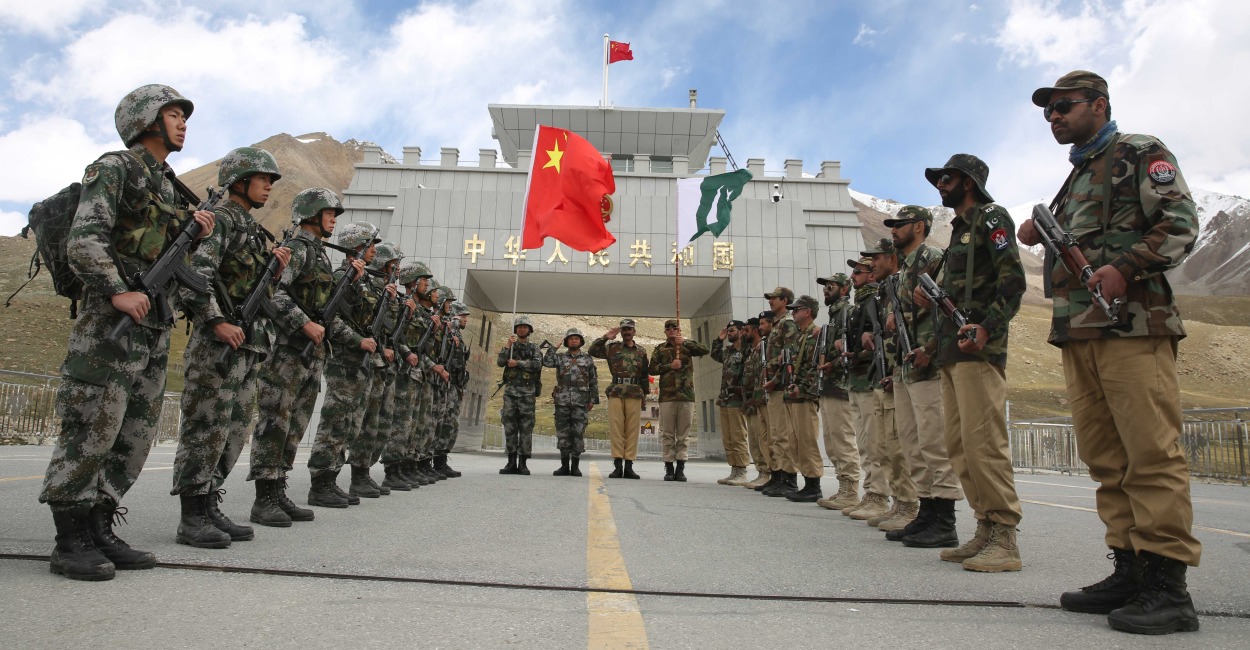Following a spate of terror attacks against its workers, China’s People’s Liberation Army (PLA) will be sending troops to Pakistan for a joint anti-terrorism exercise, a first in five years, to protect its workers and investment worth over US$ 65 billion.
The drills, named Warrior-VIII, will hone counter-terrorism tactics and strike manoeuvers. The drills are announced as Chinese workers have been the target of the terrorist attacks increasingly.
The exercise will include multi-tier and mixed training across various specialties, with live drills designed to simulate real combat scenarios. It will start in late November and will continue till mid-December.
Security issues were a priority subject during a recent meeting between the Pakistan Army Chief, Pakistan’s Prime Minister, and Chinese President Xi Jinping. After returning from China, the Pakistan Army announced the military operation ‘Azm-e-Istehkam’ to make Balochistan safe.
The Sino-Pakistan exercise is taking place after five years as there has been a rising threat against Chinese workers in the region.
In October, two Chinese engineers were killed in a bomb attack by separatists on a convoy leaving Karachi’s international airport. Those in the convoy were employees of the Port Qasim Electric Power Company, a power plant that is one of the biggest Chinese investments in Pakistan.
The Karachi attack triggered a clamor from Chinese officials for its intelligence agencies to play a more proactive role in Pakistan in protecting Chinese citizens in the country. The Chinese embassy in Islamabad has called on Pakistan to “severely punish the perpetrators and take all necessary measures to protect the safety of Chinese citizens, institutions and projects in Pakistan.”

In 2021, nine Chinese workers were killed in what Beijing called a “bomb attack” on a bus in northern Pakistan. In 2022, a suicide bomber killed Chinese teachers in Karachi.
Thousands of Chinese workers are in Pakistan, primarily engaged in Beijing’s China-Pakistan Economic Corridor (CPEC) project, which is part of its multibillion-dollar Belt and Road Initiative (BRI).
China’s investment in Pakistan has been one of the largest under Xi Jinping’s flagship BRI project. China does not forget to remind Pakistan to fulfill its security commitments regarding the China-Pakistan Economic Corridor, which will help Beijing connect its western Xinjiang province with the Arabian Sea via Pakistan.
The infrastructure is intended for shipping Chinese goods via the Xinjiang region across the mountain border through Pakistan and into the Arabian Sea at Gwadar port, around 630 kilometers (390 miles) west of Karachi.
Besides shortening the trade routes, it will also help China avoid the contentious Malacca Strait choke point, a narrow strait linking the Pacific Ocean with the Indian Ocean.
Chinese Investments In Pakistan
Chinese investment is crucial to Pakistan. With its economy in the doldrums, Pakistan’s infrastructure development depends on China. Islamabad is facing mounting debts from Chinese investors who have funneled billions of dollars into the country’s energy sector since 2013. Beijing is Pakistan’s largest external creditor.
In the first phase of CPEC, dozens of projects, mainly related to power and transport infrastructure, were carried out with Chinese money. The initiative’s second phase, which began in December 2022 and comprises 27 projects, has focused on boosting manufacturing capacity and job creation.
Beijing has been pumping money not only into Pakistan’s economic hubs but also into places like Pakistan-administered Kashmir and northwestern Khyber Pakhtunkhwa province.
However, Chinese investment has not gone down well with rebels fighting for freedom in Balochistan. The largest separatist group in Balochistan, the Balochistan Liberation Army, has turned on the heat on Chinese laborers working in the resource-rich province.
Separatist militant groups, such as the banned Balochistan Liberation Army (BLA) and Balochistan Liberation Front (BLF), have long targeted Pakistani security forces and Chinese nationals, accusing them of exploiting the province’s resources.
“We will target all Chinese economic interests, investments, and military installations, knowing that there will be no haven for them on Balochistan soil,” BLA has warned in a recent statement on Telegram.
Militant groups, including separatists in the south-western Balochistan province and the Pakistani Taliban, have stepped up attacks throughout Pakistan, which has become a hotbed of terrorist activity since the withdrawal of US and Nato troops from Afghanistan in 2021 that left a security vacuum in the region.
The year 2024 has seen the death of over 1,500 people in terrorist attacks in Pakistan, according to the South Asia Terrorism Portal.
Pakistan is trying to convince Chinese companies to shift operations into Pakistan by creating nine special economic zones under the CPEC. However, the International Monetary Fund has asked Pakistan to stop setting up any industrial zone offering investment incentives, such as tax breaks and subsidies.
After securing a US$7 billion loan from the IMF, Pakistan authorities are working to invite about 100 major Chinese industries to invest in the textile parks that Ruyi Shandong Group will start building in its southern Sindh and central Punjab provinces later this year. However, with rising terror incidents, Pakistan’s ability to provide security to Chinese investments remains under doubt.




